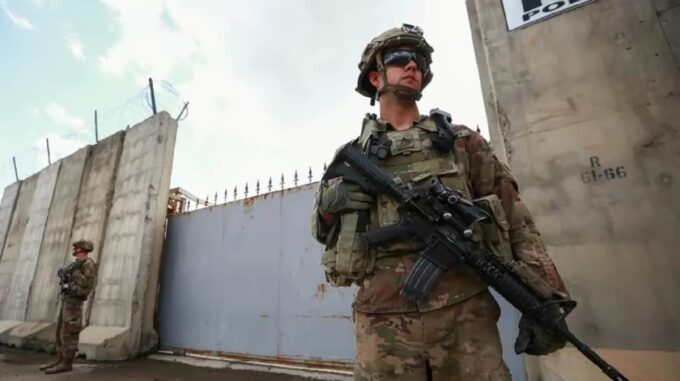American media reports that a partial evacuation of the U

S. embassy in Iraq is being prepared, along with the possibility of allowing family members of military personnel to leave the region due to increasing security threats in the Middle East. This decision has been made in response to the tense situation that has long been causing stress in the region, which has led to a significant rise in oil prices and prompted the global community to pay close attention to events in the area. According to information from Reuters, several American and Iraqi sources are already working on preparations for a partial evacuation and the possible allowing of military families to leave the theater of military operations in Iraq and other Middle Eastern countries. Details regarding specific threats or reasons for this decision remain private, as anonymous sources have not disclosed them. In official statements, it is noted that oil price fluctuations have sharply increased—by more than 4%—in response to assumptions about a possible evacuation and rising military tensions. White House spokeswoman Anna Kelly stated in her official remarks that the U.S. administration regularly reviews the presence of American personnel abroad. She emphasized that the evacuation decision results from a recent security review and is a preventive measure aimed at protecting diplomatic staff. At the same time, the U.S. Department of Justice announced that President Donald Trump has been informed of this step, indicating the seriousness of the situation and growing anxiety within Washington's governmental circles. An administration representative added that the U.S. Embassy in Kuwait remains open and continues its work in usual mode, without adjusting personnel policies amid the complex situation. The escalation of tensions in the region, against the backdrop of a conflict that has been ongoing for over a year and a half, has particularly alarmed the international community. After 18 months of fierce fighting in Gaza and the increasing likelihood of a broader conflict between Israel and Palestine, the situation in the Middle East has been further complicated by calls for global powers and military alliances to exercise caution and prepare for unpredictable scenarios. Tensions are also escalating in international politics. U.S. President Donald Trump has repeatedly warned Iran about the possibility of strikes if the situation worsens or if Tehran does not comply with demands to change its nuclear program. In an interview published on Wednesday, he stated that he does not strongly believe Iran’s leadership can halt uranium enrichment, which is a key condition for reaching diplomatic agreements. On Wednesday, high-ranking Iranian military officials openly declared their readiness to respond in any way, including militarily, if the country were attacked. Aziz Naserzadeh, Iran’s Defense Minister, emphasized that any attack by the U.S. would be met with a response targeting American military bases in the region. This has further heightened the situation and added fuel to the fire of diplomatic and military tensions. The U.S. military presence in the region remains substantial. The country maintains bases in Iraq, Kuwait, Qatar, Bahrain, and the United Arab Emirates, creating potential mechanisms for response if the conflict intensifies. According to senior officials, U.S. Secretary of Defense Prit Hegseth has already approved a plan for evacuating family members of service members from several military sites in the Middle East, including those located in Bahrain. Regarding specific measures, efforts are underway to carefully and organizedly evacuate personnel from American diplomatic missions in the region. The use of commercial transportation options for evacuation is also possible, but the military is prepared to assist all those in danger. As a result, consultations and monitoring of the situation continue in Washington and London. “We are preparing for any scenarios, including the possible evacuation of our personnel,” sources in diplomatic and military circles are quoted as saying. Currently, in Iraq, particularly in Baghdad, there are no signs of an immediate threat to security. The country’s government states that the situation is being controlled and that there are no current threats to the safety of foreign diplomats. Meanwhile, U.S. air bases in Qatar, including Al-Udeid, the largest military base in the Middle East, continue to operate normally without any changes to their routine or evacuation alerts. Overall, the situation in the Middle East remains tense and potentially explosive. Official agencies and military experts are making significant efforts to minimize risks, but unknown factors and rapid developments could change the scenario at any moment. All parties are expected to closely monitor the situation and act accordingly to new challenges in order to prevent further escalation of the conflict and to ensure a safe environment for Ukrainian and other foreign citizens in the region.

